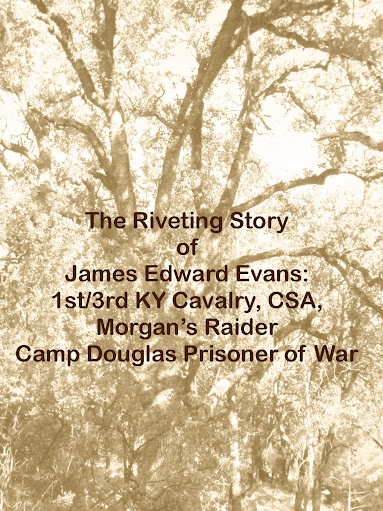
By the spring of 1863, John Hunt Morgan had public acclaim, a stunning new wife, and had recently been promoted. Yet, Morgan was not content. He aspired to a position in history far grater than that of Brigadier General in the Army of Tennessee.
Indisposed to remaining a subordinate officer, Morgan was plotting a path to greater glory. He began by exploiting the fact that his senior officer, General Pegram, was incompetent and generally disliked.
While Pegram had difficulties relating to volunteers who lacked formal military training, Morgan had the common touch. His men’s adulation bordered on hero worship.
“Morgan was in the zenith of his fame. I was inoculated with the idea that his judgment was unerring and that the ‘King could do no wrong.’ In the mortal apprehension I never once thought of trusting in God for safety, but wholly relied upon the wisdom and skill of John Morgan."
~ Bromfield L. Ridley
In late April 1863, Morgan dispatched scouts north to the Ohio River to seek spots in which it would be possible to ford the river. Morgan was putting the first steps of his Machiavellian grab for eternal acclaim into action. Morgan planned to take the war to Northern soil.
May 1, 1863
Morgan relished public acclaim. On May 1, 1863, the Confederate Congress issued the following statement regarding Morgan’s Men:
“entitled to the love and gratitude of their countrymen for the magnificent feat preserving Middle Tennessee for the Government.” [i]
It was considered the pinnacle of tribute to be mentioned in dispatches and receive Congressional commendation. Yet, even this public praise was not enough to satiate Morgan’s thirst for prominence.
May 10, 1863
The price a warrior pays for renown is constantly placing his life in danger.
On May 10, 1863, “Stonewall” Jackson was accidentally shot by his own men. Ironically, Jackson said,
“My religious belief teaches me to feel as safe in battle as in bed. God has fixed the time of my death."
When Jackson realized he was going to die, he calmly stated,
“I always wanted to die on a Sunday.”[ii]
What effect did Jackson’s death had a profound effect on the Confederacy and became the subject of popular poems and ballads. Was the memorializing of “Stonewall” motivational to Morgan’s schemes?
Why did John Hunt Morgan plan the Great Raid? What were his objectives? There are several theories as to his motivations:
- James Ramage makes a powerful case suggesting that Morgan’s raids filled his need to impress his new wife Mattie and dispel rumors that marriage had caused him to lose his edge. [iii]
- Ramage also advocates that Morgan desired cross over into Pennsylvania and join forces with Lee and toyed with the notion of moving into Illinois[iv] If Morgan sought to create a place for himself in the annuals of history, equal to that of Jackson’s or Lee’s, this notion of joining forces with Lee would have be a very great motivation indeed.
- The Official Records state that Morgan’s mission was to “divert the attention of the Union Army.”[v]
- Basil Duke implies that Morgan’s plan was to invade above the Ohio River, drawing forces from the East to help Lee on his invasion into Pennsylvania. This action would also cover General Bragg's retreat.[vi]
- General Bragg sent Morgan off on a diversionary raid to Kentucky ordering him to destroy the railroad lines important to Union General Rosecrans in Nashville. [vii]
- Some researchers suggest that Morgan was determined to enlist new recruits to the Southern cause by drawing from members of Copperheads and Knights of the Golden Circle while in the North. On early June of 1863, Morgan requested Thomas Hines to lead party of 25 men into Indiana and pose as a Union patrol searching for men who had gone AWOL. Their secret mission would be to determine if Southern sympathizers would support or join the impending raid. After visiting Copperhead leader Dr. William A. Bowles on French Lick, Hines learned that no formal support would be forthcoming.[viii] Hines rejoined Morgan at Brandenburg, in time to forewarn Morgan of lack of support. Thus, it would seem highly unlikely that recruitment was one of Morgan’s primary objectives.
Did Morgan’s superior officers know of his plan to cross the Ohio River? As even the men in Morgan's command didn't always know their destination until after they arrived, it is entirely possible that the only person Morgan entrusted with the full details of his plan was his brother-in-law Basil Duke. General Wheeler, Morgan's immediate superior, twice gave his permission for Morgan to raid as far north as Louisville. He did not seem aware of Morgan’s plan cross the Ohio River and continue northward.[ix] General Bragg however seemed far more aware of Morgan’s intent.
“Go ahead and raid Kentucky. Capture Louisville if you can. But do not, I repeat do not cross the river. Stay in Kentucky. Go anywhere you want in your home state, but I command you to stay south of the river.”
~ From General Braxton Bragg’s communication to Morgan [x]
Lester Horwitz puts forward yet another theory of what motivated Morgan to cross the Ohio River.
"But Morgan went against orders and crossed the Ohio. The reason was that earlier, a Union cavalry officer had gone behind Confederate lines in a raid. Morgan said he would show them.
It was his ego that drove him to cross the river to show he was as good or better. Morgan rode more than 1,000 miles to prove it." [xi]
May 15, 1863
One clear motivation was Morgan’s covetous of command.
"I can only wish that you were permanently in command of my cavalry; and should I have the good fortune to have you assigned to command, I will so arrange it. In the mean time, I am informed that General Pegram, at present in command of the cavalry of this department, is your senior…With your consent, I will endeavor, at the proper time, to obtain your transfer to my department."
~letter from Major General Simon Bolivar Buckner to John Hunt Morgan, May 15, 1863 [xii]
Possessing a very high opinion of his capabilities, Morgan was quite difficult to command. Consequently, Pegram and Morgan did not have an amiable working relationship.
“…General Morgan is your junior... You are aware of the feeling which exists in some irregular organizations in reference to being commanded by regular officers. In your relations with the troops, even more than with General Morgan, you should endeavor to conciliate that feeling. I have written to General Morgan, informing him that I have a right to expect from him a hearty co-operation with you as his senior. I feel assured that you will receive from General Morgan his able and hearty support, if you show toward him and his command the proper consideration and a spirit of great conciliation.”
~ A letter from Major General Simon Bolivar Buckner to Pegram on May 15, 1863
Such reconciliation was not to be! Morgan’s desires were far too great to be appeased by mere platitudes.
ENDNOTES
[i] Holland, Cecil Fletcher. “Morgan and his Raiders,” 1943 p. 162.
[ii] Scott, Jeffery Warren and Jeffreys, Mary Ann. “Fighters of Faith” http://www.christianitytoday.com/holidays/memorial/features/33h034.html
[iii] Ramage, James A. “Rebel Raider,” Chap. 12, pages 146-147.
[iv] Ramage, James A. “Rebel Raider,” Chap. 14 p. 159
[v] U.S. War Department, “The War of the Rebellion: A Compilation of the Official Records of the Union and Confederate Armies,” 70 volumes in 4 series. Washington, D.C.: United States Government Printing Office, 1880-1901. Vol. 21, Part I pages 818.
[vi] Duke, Basil Wilson, “A History of Morgan's Cavalry,” Cincinnati, Ohio: Miami Printing and Pub. Co., 1867. page 460.
[vii] U.S. War Department, “The War of the Rebellion: A Compilation of the Official Records of the Union and Confederate Armies,” 70 volumes in 4 series. Washington, D.C.: United States Government Printing Office, 1880-1901. p. 817
[viii] Horan, James D. “Confederate Agent: A Discovery in History,” 1954, pp. 24-28.
[ix] U.S. War Department, “The War of the Rebellion: A Compilation of the Official Records of the Union and Confederate Armies”, 70 volumes in 4 series. Washington, D.C.: United States Government Printing Office, 1880-1901. p. 817 -818.
[x] Stephen Starr, “Colonel Grenfell’s War” 1971, p. 44
[xi] McNutt, Randy .“Volunteers hope to save memory of Morgan's Raid,” The Cincinnati Enquirer, Monday, October 28, 2002. McNutt was quoting Lester Horwitz.
[xii] U.S. War Department, “The War of the Rebellion: A Compilation of the Official Records of the Union and Confederate Armies”, 70 volumes in 4 series. Washington, D.C.: United States Government Printing Office, 1880-1901. Vol. 21, Part I, p. 316





No comments:
Post a Comment